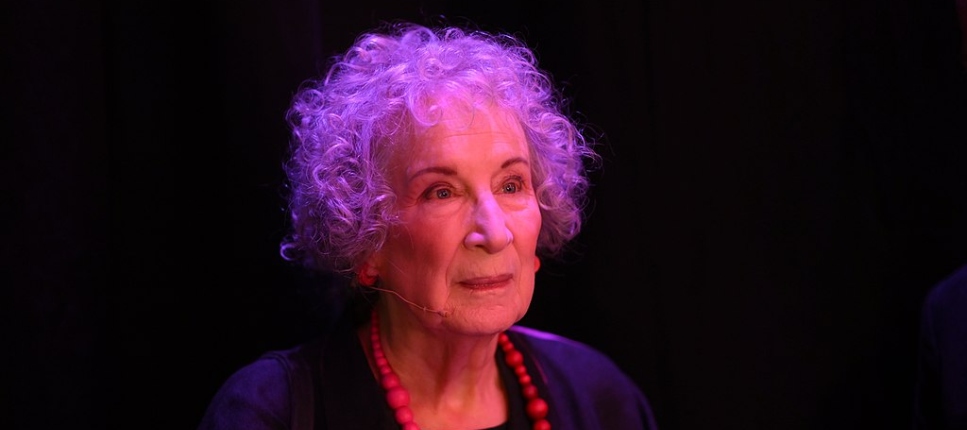
TODAY: In 1939, Margaret Atwood is born. (Photo by Stephen McCarthy.)
-
Celebrating 400 years of Shakespeare’s first folio: Six scholars weigh in on the most important 844,421 words in literature. | Lit Hub History
-
Kali Fajardo-Anstine invites you into the Southwest lands of Willa Cather’s Death Comes for the Archbishop. | Lit Hub Criticism
-
“We all lie to ourselves. We manipulate with what phrases we leave behind.” Jenny Erpenbeck on spying, lying, and eros. | Lit Hub In Conversation
-
“Why does the empathy we cultivate through literature often remain a performative gesture, confined to the realm of fiction and failing to take root in the real world?” Etaf Rum on reading and writing during crisis. | Lit Hub
-
Frank Falisi reflects on Kenneth Branaugh and the de-Poiroting of Hercule Poirot. | CrimeReads
-
Michael Cunningham’s Day, Benjamin Taylor’s Chasing Bright Medusas: A Life of Willa Cather, and Claire Keegan’s So Late in the Day all feature among the Best Reviewed Books of the Week. | Book Marks
-
Mari Cohen takes an in-depth look at the 92nd Street Y’s recent postponement of Viet Than Nguyen’s Poetry Center talk, and what the subsequent backlash means for the organization going forward. | Jewish Currents
-
At 94 years of age, Jurgen Häbermas has published a 1,752 page work covering the history of philosophy over the past 2,500 years. | El País
-
“How to describe her astounding style? Lucid and mysterious? Wry and plaintive? Colloquial and oracular? I wanted her to tell me.” Poets pay tribute to Louise Glück. | LARB
-
An ode to Jezebel, from the site’s former editor Kate Dries. | LA Times
-
“We really feel death every second. We smell death everywhere.” Testimonies from Gaza. | n+1
-
“‘Kairos’ is her most direct and sustained depiction of the historical rift she herself lived through and thus her most explicitly personal novel.” Ross Benjamin on Jenny Erpenbeck’s ambivalent nostalgia. | The Point
-
“For years, trans artists have alchemized disgust, rage, and monstrosity to give birth to cybernetic and primordial work. Rarely are they enshrined in the canon of transgressive women artists.” Grace Byron on bringing more trans artists into the transgressive canon. | Lux
-
Take a look at the world’s greatest dictionary collection. | Atlas Obscura
-
As schools across the US eliminate librarian positions, what will the consequences be for students? | Governing
-
Bernardine Evaristo, Jeanette Winterson, Stephen Marche and more writers reflect on the threats and possibilities of AI. | The Guardian
-
From Sinan Antoon, poetry that gives voice to “a Palestinian child’s experience of Israeli bombardments, displacement, and a longing to return home.” | Words Without Borders
-
Adrienne Westenfeld talks to LeVar Burton about fighting for the right to read in an era of book bans. | Esquire
-
In praise of Emily of New Moon, the oft-forgotten L.M. Montgomery novel that deserves a second look. | New York Times
-
Have you considered… not writing a memoir? | The Atlantic
-
Imagination’s book: A centennial celebration of William Carlos Williams’ hybrid work Spring and All. | JSTOR Daily
Also on Lit Hub:
Look inside Shakespeare’s first folio • The Bard’s role in 20th-century China • 40 books to understand Palestine • A statement of solidarity with Gaza from more than 100 literary translators • How Ruth Bader Ginsburg’s collars became political signifiers • Alligator poaching in the heart of the Everglades • On the sacredness of prison libraries • What minimum-wage jobs taught Joanne McNeil about writing novels • The false promise of climate fiction • The early days and inspirations of Willa Cather • Why Merchant Ivory’s Maurice is a still-resonant queer text • When Europe was in its revolution era • The case for wordless picture books • James Elkins on the joy of immersion in a place • On the urgent wartime writings of Isaac Bashevis Singer • Three moments in the life of Einstein • Searching for Swedish literary prodigy Stig Dagerman’s typewriter • Beth Kephart considers the eternal hope of rare books • Nina LaCour on finding a story in her own backyard • On the magic of magnetic force • How Michele Wallace shaped Black feminist literary culture • Before the ubiquity of movie trailers, we had Siskel & Ebert • How wolves are represented (and demonized) across cultures • Tim Robinson on the lore of Connemara • How the NYPD policed immigrant neighborhoods in the early 20th century • Learning to ride a motorcycle after 50 • Approaching social repair in Appalachian Kentucky
